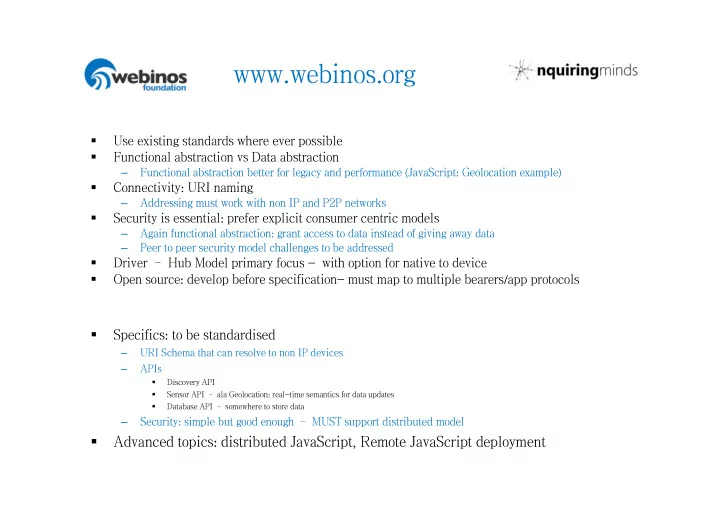

www.webinos.org Use existing standards where ever possible Functional abstraction vs Data abstraction – Functional abstraction better for legacy and performance (JavaScript: Geolocation example) Connectivity: URI naming – Addressing must work with non IP and P2P networks Security is essential: prefer explicit consumer centric models – Again functional abstraction: grant access to data instead of giving away data – Peer to peer security model challenges to be addressed Driver – Hub Model primary focus - with option for native to device Open source: develop before specification- must map to multiple bearers/app protocols Specifics: to be standardised – URI Schema that can resolve to non IP devices – APIs Discovery API Sensor API – ala Geolocation: real-time semantics for data updates Database API – somewhere to store data – Security: simple but good enough – MUST support distributed model Advanced topics: distributed JavaScript, Remote JavaScript deployment
WOT is the scope? JavaScript Hard use case Direct Multiplexing hub with limited footprint using driver metaphor to convert to common JSON-RPC language Serial JSON-RPC Hub RF Browser Internet JSON-RPC Bl;ue JavaScript JavaScript Zigbe All connections TLS mutually MQTT authenticated with PKI certs JSON-RPC JSON-RPC JSON-RPC Peer to Peer connections Hub Server Driver JavaScript JavaScript Embedded server
Questions What are the challenges for adapting W3C approaches to IOT/WOT issues? How important and CoAP, MQTT to and approach? How far should we go in defining a security model for WOT work? Why are functional abstractions so important for IOT?
Recommend
More recommend